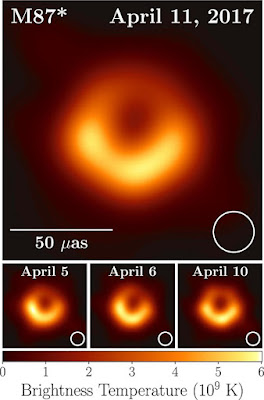...So the interwebs went crazy last week with the first-ever photo of a black hole, and with the young computer whiz who was part of the team. So what's the deal with the supermassive black holes, we've all seen pictures of them, right?
In case you didn't notice, everything we've seen have been artist illustrations (or Christopher Nolan's sci-fi) based on unproven theory, and this real-life picture shows that theory is, at the very least, on the right track. But I'd say it's not really about black holes, it's a lot more profound.
We live in a depressing world plagued by wars, bigotry and xenophobia, criminality, and declining confidence over traditional institutions -- governments, culture, religions, and science. So never take for granted the massive accomplishment -- something to be very proud of -- that we are able to link up 8 telescopes from Greenland all the way to Antartica, undertake coordination among 13 scientific institutions, and manage a global, multi-year effort towards one single goal. That blurry orange blob is just the start -- not the end -- of a major scientific endeavor.
As with most scientific work, oftentimes we just don't know where things would lead to. Viagra was discovered when chemists were working on heart disease drugs. Alexander Fleming accidentally found mold as he was working with Staphiloccocus bacterium, leading to an antibiotic that has transformed modern medicine and saved millions of lives.
For the next 100 years, the single biggest challenge facing humanity is climate change. We've already seen its adverse effects, especially on some of the most vulnerable societies like the Middle East/Africa and Latin America, but also wealthier parts of Europe (Brexit, anyone?) and the US (California wildfires, Colorado River drought, etc). Many (most?) scientists believe climate change is anthropogenic, which is actually encouraging, because it means we can do something about it. Astronomy as a science is highly relevant in this effort, because as we see more unprecedented extreme weather events, we can look for examples out beyond our home planet. Climatologists have studied Venus, seeing what earth may look like when impacted by runaway greenhouse effect. When we study Jupiter and Saturn, we can see gigantic permanent storms larger than the earth's diameter.
So we may not know where studying black holes will lead us. But we're only scratching the surface now, and chances are, we will need that knowledge for our long-term survival.
 |
| Black hole "Gargantua" from Interstellar (2014) |



No comments:
Post a Comment